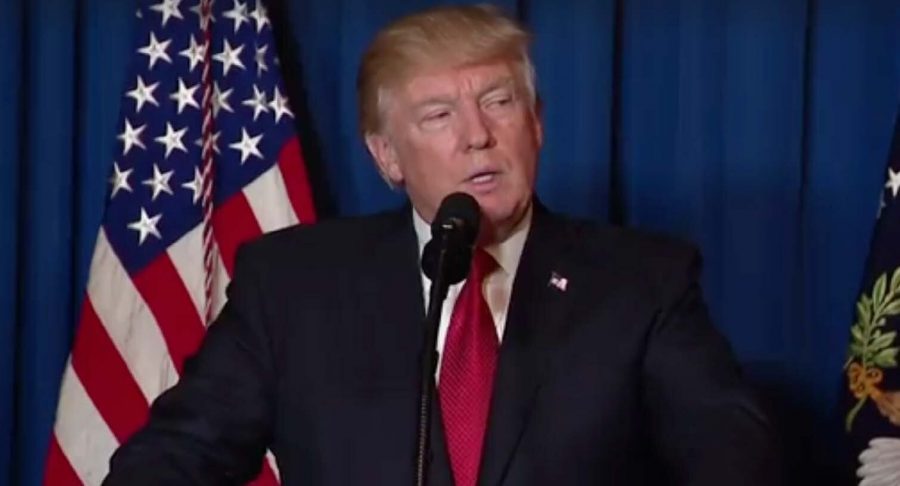Trump administration cuts funding for environmental agencies
March 2, 2020
The government agency that would be impacted the most by these reductions is the Environmental Protection Agency, as the budget outlines a 26% decrease to the agency’s funding.
Along with getting a cut in funding, the EPA would lose up to fifty of its programs and see major decreases in the federal funding allocated to their research and development if the proposed budget is approved.
“The proposed spending reductions mark the latest effort by the administration to chip away at government agencies focused on science, the environment and public lands,” said Rebecca Beitsch and Rachel Frazin of The Hill.
“The White House budget request would reduce spending at the Energy Department by 8% and cut 16% from the Department of the Interior’s budget.”
These proposals have been another step among many that the Trump administration has taken in an attempt to pacify the growing concerns surrounding climate change.
Before and after entering office at the beginning of 2017, President Trump has continuously conveyed an ambivalent attitude towards climate change and has often contradicted himself in tweets and interviews concerning the matter.
Prior to his presidency in 2012, Trump notoriously stated climate change was a hoax, claiming it was “created by and for the Chinese in order to make U.S. manufacturing non-competitive.”
While the president has since gone on record claiming he is an environmentalist, Helier Cheung of BBC News notes that it is
unclear whether or not Trump understands the magnitude of the existential dilemma climate change poses.
This is evident in the president’s tendency to disassociate the United States with any international agreement or domestic law that attempts to reduce the effects of climate change.
Only a few months into his presidency, Trump withdrew the United States from the Paris Agreement on climate change and has since replaced the Clean Power Plan, passed by former president Barack Obama, with the Affordable Clean Energy rule that has more lenient policies on the use of coal and other natural resources.
“He’s completely halted and reversed the momentum that was built up during the Obama administration in fighting climate change,” said Professor
Michael Gerrard of Columbia University.
Taking this all into consideration, the Trump administration’s new proposed budget and the withdrawal of significant funding for environmental agencies should come as no surprise.
“Trump has consistently proposed cutting funding for those agencies,” said Rebecca Beitsch and Rachel Frazin. “And Congress has routinely ignored the president’s budget request by instead increasing funding.”
The reason behind the president’s decision to relocate these critical funds, however, may go deeper than his skepticism and ambivalence towards scientists and their theories about climate change.
A majority of the waterway protection projects being worked on by environmental programs belonging to federal agencies that the Trump administration’s budget has explicitly wanted to cut funding from.
They also happen to be located in historically democratic states, such as New York, Maryland and Washington. The environmental projects the budget does not financially neglect happen to be located in swing states, like the Everglades in Florida or the entirety of the Great Lakes region.
The impact of the cutbacks in federal funding for these environmental programs runs deeper than just the data and results they produce.
“Among the 50 programs targeted by the administration are ones that help fight pollution, radon, lead, as well as those that give clean water grants to small and disadvantaged communities,” according to The Hill.
Moreover, the reduction in federal grants would limit the EPA to 12,500, which is an incredibly lower number than the 17,000 agency employees that existed only a decade ago.
Despite all of these foreseeable detrimental effects, members of the Trump administration are still defending the proposed budget for 2021, arguing the environment and the agencies dedicated to protecting it would be benefit from this proposed budget cut.
The Trump administration said in a statement, “The elimination would enable a streamlining of Federal activities and ensures more focus on early-stage [research and development], where the Federal role is strongest and reflects the private sector’s role in commercializing technologies.”
Although some organizations will benefit from the increase of attention from upper management, the budget — at times — supports organizations that continue to profusely utilize natural resources and fossil fuels more than it tries to limit the effect of climate change.
“The Interior Department’s budget would also provide for the development of both fossil fuels and renewable energy on public lands, although in certain areas the budget provides greater funding for fossil fuel sources.”
While the proposed budget is still not approved and can potentially undergo several changes, it would be another major rollback by the Trump administration in the fight against climate change if it gets passed.
Reducing the amount of federal funding granted to EPA and other environmental agencies supported and funded by the government seems counter-intuitive, considering what little time the world has left to combat climate change before we are past the point of no return.








